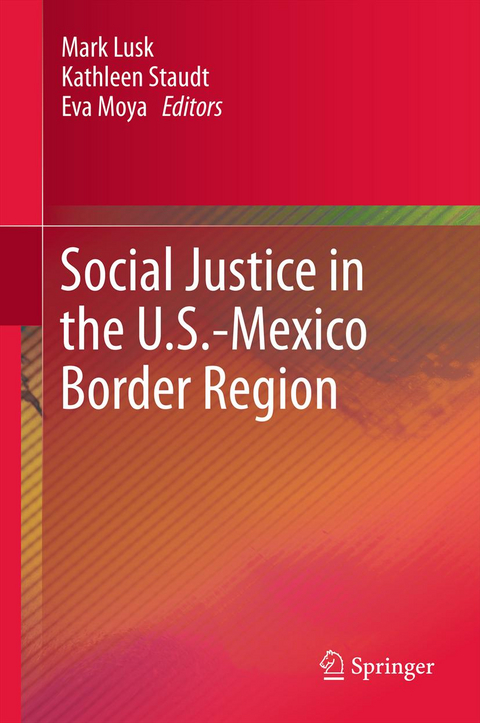
Social Justice in the U.S.-Mexico Border Region
Springer (Verlag)
978-94-007-9370-5 (ISBN)
The U.S.-Mexico Border Region is among the poorest geographical areas in the United States. The region has been long characterized by dual development, poor infrastructure, weak schools, health disparities and low-wage employment. More recently, the region has been affected by the violence associated with a drug and crime war in Mexico. The premise of this book is that the U.S.-Mexico Border Region is subject to systematic oppression and that the so-called social pathologies that we see in the region are by-products of social and economic injustice in the form of labor exploitation, environmental racism, immigration militarism, institutional sexism and discrimination, health inequities, a political economy based on low-wage labor, and the globalization of labor and capital. The chapters address a variety of examples of injustice in the areas of environment, health disparity, migration unemployment, citizenship, women and gender violence, mental health, and drug violence. The book proposes a pathway to development.
Mark Lusk is professor of social work and associate dean of health sciences at the University of Texas at El Paso. A Latin Americanist and international development specialist, he has worked and lived throughout Latin America and other regions of the developing world. He was Fulbright Scholar in Peru and a decade later in Brazil. Kathleen Staudt is professor of political science at the University of Texas at El Paso. A well-known scholar on border studies, Kathy has written and edited 16 books on the US Mexico border, women’s rights and violence against women. Eva Moya is assistant professor of social work at the University of Texas at El Paso. She has worked extensively in research on border health disparities and infectious disease.
Section I. Introduction and Conceptual Framework.- Chapter 1. Social Justice in the U.S. - Mexico Border Region: A Conceptual Framework; Mark Lusk, Kathleen Staudt, & Eva Moya.- Section II. Critical Perspectives on the Border Region.- Chapter 2. Political Economy and Social Justice in the US Mexico Border Region; Josiah Heyman.- Chapter 3. The Violence of Citizenship on the U.S.-Mexico Border: How Citizenship Creates Exclusion and Inclusion; Tony Payan.- 4. Women, Gender and Violence in La Frontera; Kathleen Staudt.- Chapter 5. A Theological Perspective on Social Justice in the U.S.- Mexico Border Region; John Stowe.- Section III. Problems and Opportunities on the U.S. - Mexico Border.- Chapter 6. Housing, Colonias and Social Justice on the Border; Guillermina Gina Núñez-Mchiri.- Chapter 7. Achieving Health Equity and Social Justice; Nuria Homedes.- Chapter 8. Mental Health Disparities and Social Justice; Griselda Villalobos & Arthur Islas.- Chapter 9. Border Health: Health Inequities, Social Determinants and the Case of Tuberculosis and HIV; Eva Moya, Oralia Loza & Mark Lusk.- Chapter 10. Environmental Injustice in the U.S. - Mexico Border Region; Sarah E. Grineski & Patricia Juarez.- Chapter 11. Migration and Discrimination: The Social Condition of Mexican Migrants who are Repatriated to Ciudad Juárez; Irasema Coronado & Héctor Padilla.- Section IV - Moving Forward: Steps in Achieving Border Justice.- Chapter 12. Education Policies: Standardized Testing, English-Language Learners, and Border Futures; Pauline Dow & Kathleen Staudt.-Chapter 13. Border Challenges and Ethnic Struggles for Social Justice: Latina/o Communities under Siege; Rosalía Solórzano Torres.- Chapter 14. Social Justice in the U.S. - Mexico Border Region: Implications for Policy and Practice; Mark Lusk, Kathleen Staudt & Eva Moya.- Afterword; Monsignor Arturo Bañuelas.
''Social Justice on the US Mexico Border is the most comprehensive interdisciplinary book I have encountered dealing with justice and human rights issues on the US Mexico border region. The wealth of its contents stems from its interdisciplinary analysis. This book must be read by all responsible policy makers who have the capacity to influence the living conditions of millions of people living between two cultures, two worlds and two ways of life." Hector Luis Diaz, Ph.D., Professor and Chair, Department of Social Work, The Univrsity of Texas - Pan American "Social Justice in the the U.S.-Mexico Border Region frames the broad issues of how to value human rights and bring dignity to the lives marginalized border residents. The conceptual framework allows the reader to gain insights about how gender and violence are often linked, health disparities are magnified, and services like mental health care are so challenging to navigate in the borderlands. I strongly recommend this book for those seeking to better understand the human dimension of the inequalities which exist along the U.S.-Mexico border."Christine Thurlow Brenner, Ph.D. President, Association of Borderlands Studies, Associate Professor of Public Policy and Public Affairs University of Massachusetts
| Erscheint lt. Verlag | 18.7.2014 |
|---|---|
| Zusatzinfo | XII, 288 p. |
| Verlagsort | Dordrecht |
| Sprache | englisch |
| Maße | 155 x 235 mm |
| Themenwelt | Sozialwissenschaften ► Politik / Verwaltung ► Politische Theorie |
| Sozialwissenschaften ► Soziologie ► Allgemeine Soziologie | |
| Schlagworte | Anti-immigrant sentiment • Economic Development in the United States • Life in the U.S.-Mexico Border • Migration • Social Justice on U.S.-Mexico border affairs • United States and Mexico • US-Mexican Border Studies |
| ISBN-10 | 94-007-9370-7 / 9400793707 |
| ISBN-13 | 978-94-007-9370-5 / 9789400793705 |
| Zustand | Neuware |
| Haben Sie eine Frage zum Produkt? |
aus dem Bereich


